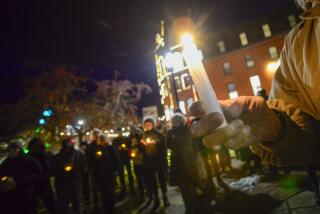George Zimmerman unlikely to face federal charges
- Share via
WASHINGTON — George Zimmerman is unlikely to face federal charges for killing black teenager Trayvon Martin because it would be difficult to prove he acted out of racial bias, Justice Department officials said Tuesday.
Four years ago, Congress adopted a stronger federal hate crimes act to empower federal prosecutors to go after violent crimes of bias. Since then, the Obama administration has won convictions against more than 140 defendants who chose their victims because they were gay, disabled or members of racial or religious minorities.
But a successful federal prosecution of Zimmerman would require clear evidence that he set out to attack the unarmed Martin because he was black.
Although that is exactly what many Americans see in the fatal shooting of the 17-year-old, it can be very hard to prove in court, legal experts said. So far, prosecutors have not shown evidence that Zimmerman acted out of racial bias.
“I’d be very, very surprised if we took it,” said one federal civil rights prosecutor, speaking anonymously because no decision had been made. “It’s a very tough, tough case to sell” because of the lack of witnesses.
“The difficult element would be proving racial motivation beyond a reasonable doubt,” said University of Michigan law professor Samuel Bagenstos, a former civil rights attorney in the Obama administration. “In most of these [hate crime] cases, you have someone who had made racial statements or you have a group who goes looking to attack a person based on their race.”
But in the confrontation between Zimmerman and Martin, “no one else was there who could testify about the motivation,” he said.
Atty. Gen. Eric H. Holder Jr. said at the NAACP convention in Orlando, Fla., on Tuesday: “We are mindful of the tragic and unnecessary shooting death of Trayvon Martin last year — in Sanford, just a short distance from here.”
He reiterated that federal prosecutors had an “open investigation” into the shooting. “While that inquiry is ongoing, I can promise that the Department of Justice will consider all available information before determining what action to take,” he said.
Holder said laws like Florida’s “stand your ground” statute, which allow someone who feels in danger to respond with violence without retreating, must be “examined” because they eliminate “the common-sense and age-old requirement that people who feel threatened have a duty to retreat, outside their home, if they can do so safely.”
Benjamin Todd Jealous, president of the National Assn. for the Advancement of Colored People, has called on Holder and the Justice Department to prosecute Zimmerman on a hate crime charge.
“It is clear George Zimmerman’s bias played a major role in the events that led” to the shooting, Jealous said. He noted that Zimmerman had made dozens of calls to police, “disproportionately about young men of color who he thought were suspect.” He also noted that Zimmerman said on the night of attack, “These punks always get away with this.”
Jealous agreed the law required evidence of racial bias. “We believe there was enough evidence to satisfy that standard,” he said.
Some advocates also have called for charging Zimmerman with violating Martin’s civil rights. But a civil rights count is limited to defendants who act “under color of law” — that is, wielding government authority.
One such example involved four Los Angeles police officers who were acquitted in 1992 in the beating of motorist Rodney King. Federal officials later charged them with violating King’s constitutional rights; two officers were convicted. Zimmerman was not a police officer when he got out of his car to pursue Martin.
The 2009 hate crimes act was named for Matthew Shepard, a young Wyoming man who was brutally beaten and left to die because he was gay. The law made it a federal crime to “willfully cause bodily injury to any person” with a weapon or explosive device “because of” the person’s race, religion, national origin, disability, gender, gender identity or sexual orientation.
In early July, the U.S. court of appeals in Denver upheld the law as constitutional. That ruling came in the case of three white supremacists who had abducted a developmentally disabled Native American and brutally abused him, including branding a swastika on his skin with a hot coat hanger. Two of the men were sentenced to 8 1/2 years in prison, while the third received a lesser sentence.
Professor Bagenstos was the deputy to the Justice Department’s civil rights chief, Thomas E. Perez, during Obama’s first term. He said a successful prosecution would require more evidence than has come to light.
“Unless there is significant new evidence, I’d say it would be unlikely the department would bring a hate crimes charge,” Bagenstos said. “It would be very difficult to win, and they don’t bring charges they don’t think they can prove.”
More to Read
Sign up for Essential California
The most important California stories and recommendations in your inbox every morning.
You may occasionally receive promotional content from the Los Angeles Times.












